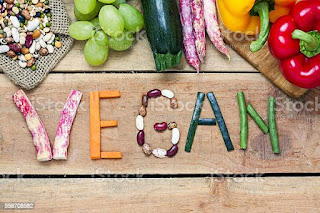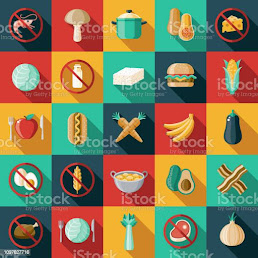Vegan vegetarian non vegetarian
Vegetarian
vegetarians are people who do not eat products or products produced for the killing of animals.People who eat vegetables do not eat meat, such as beef, pork such as chicken, turkey and duck, fish and insect repellents and other animal protein and oil obtained from animal slaughter.
However, many vegetarians eat products that do not involve the killing of animals. These include eggs, dairy products and yoghurt, honey.
Vegetarians eat fruits, vegetables, nuts, seeds, grains, and legumes, as well as "meat areas" found in these foods.
What is veganism?
Veganism is a strong way to eat vegetables. Vegetables avoid eating or using any animal products or products. The Vegan Society defines veganism as "a way of life, seeking to eliminate, as far as possible, all forms of exploitation and abuse of animals for food, clothing or other purposes."
Veganism strictly avoid eating any foods or beverages that contain meat, poultry, fish, eggs
dairy products, honey, insects other types of animal protein, stock or animal fats.
Vegans are strict and extend these principles over their diet and will try, where possible, to avoid any product that involves the use of animals directly or indirectly. These products may include leather goods, wool, silk, soap, candles, and other products containing animal fats, such as latex products containing casein, which are derived from milk protein, cosmetics or other products made by manufacturers on animals.
Many vegetarians apply some of these principles in their lifestyle, for example, by avoiding leather goods and products that involve animal testing.
Both veganism and vegetarianism grow in popularity. However, some people may find the difference between the two foods a little confusing, especially since there are so many variations in eating vegetables.
Variation
There are several known variations in vegetarian diets.
Lacto-ovo-vegetarian
People who follow this diet avoid all kinds of meat and fish but eat dairy products and eggs.
Lacto-vegetarian
People in this diet do not eat any meat, fish, or eggs but eat dairy products.
Ovo-vegetarian
People who follow this diet do not eat meat, fish, or dairy products but eat eggs.
Pescatarian
Those who follow this diet avoid all meat and expect fish and other seafood. However, this does not meet the traditional definition of vegetarianism, and many people refer to such as semi-vegetarian or flexitarian.
Health benefits
Studies show that eating a vegetarian or vegan diet can help lower cholesterol and BMI levels.
Scientific research suggests that vegetarian and vegan diets can offer health benefits.
A 2017 study by Trusted Source examined plant-based diets in 49 obese or overweight adults who had some of the following conditions:
- type 2 diabetes
- Ischemic heart disease
- high blood pressure
- high cholesterol levels
Meta-analysis Reliable source found evidence to suggest that plant-based diets can help lower levels of total cholesterol, low-density lipoprotein (LDL) cholesterol, and high-density lipoprotein (HDL) cholesterol. Researchers did not analyse how changes in cholesterol affected the effects of heart disease.
Which is more healthful?
Both diets offer the same health benefits and generally encourage people to eat whole foods that are antioxidant-rich and nutritious.
It is difficult to say which foods are healthier because both foods have advantages and disadvantages.
For example, unlike vegetables, lacto-vegetarians derive calcium, phosphorus, and vitamin D from dairy products. However, avoiding milk and eggs can help vegans keep their cholesterol levels low.
Vegans are also at risk of significant deficiency of omega-3 fatty acids, especially EPA and DHA, even if they consume plant sources of these nutrients. DHA is necessary for brain function and understanding and to avoid brain fog, memory difficulty, and more. Vegetable growers and pescatarians can easily get EPA and DHA from eggs and seafood.
Not everyone has the power to follow a vegan diet and should follow it for the right reasons, not just to lose weight. Some processed foods will have the wrong ingredients for vegans, but adopting foods that focus on natural and young products makes it easier to control.
Conclusion
A vegetarian diet has many types of foods that make it easy to enjoy a variety of foods to get enough protein and prevent nutrient deficiencies. Vegan diets are actually less healthy than vegetarian diets because of their limited diet, but vegan foods for one person can be healthier than other vegetarian diets if they eat more fruits and vegetables, whole grains, and prevent nutrient deficiencies.





Comments
Post a Comment
Do you any doubt or any feedback please let me know